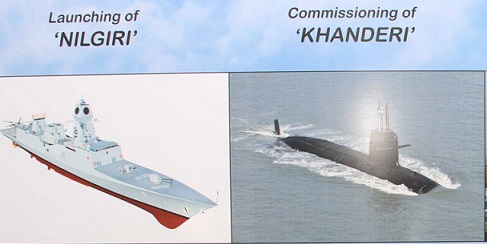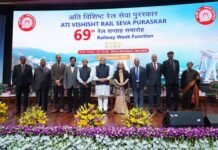By Our Correspondent/PIB
MUMBAI: Union Defence Minister Rajnath Singh on Saturday said, the Government is making concerted efforts to modernise the Navy and equip it with the best platforms, weapons and sensors to deal with any conventional and unconventional threats to India’s maritime interests.
Singh was speaking at the launch of INS ‘Nilgiri’, the first of the Navy’s seven new stealth frigates, at Mazagon Dock Shipbuilders Limited in Mumbai. He said, 70% of India’s trade by value and 95% by volume is taking place through the sea route and even a slight disruption of seaborne trade due to piracy, terrorism or conflict, could have serious repercussions on the economic growth and well-being of the nation.
Raksha Mantri said, India is growing and its commercial interests are spreading far and beyond, yet there are challenges, including a hostile neighbourhood. “State-sponsored terrorism remains a challenge and the strong-willed Government will not hesitate to take tough decisions in the larger interest of the country. The repealing of the provisions under article 370 of the constitution is one such decision. We are confident that this will usher a new era of development and prosperity in Jammu, Kashmir and Ladakh”, Raksha Mantri added.
Saying that “any credible defence of a country is based on the indigenous defence capability”, Shri Rajnath Singh emphasised on ‘Make in India’ and ‘Design and Make in India’ with regard to defence equipment.
Raksha Mantri highlighted that Directorate of Naval Design has designed over 19 classes of ships to which more than 90 ships have been built since then. He said, today India belongs to an elite group of nations which is building its own Aircraft Carrier and Strategic Submarines. “Out of total 51 ships and submarines on order at various shipyards as on date, 49 are being constructed indigenously. This contributes to our target of building a five trillion dollar economy by 2025 and 70% defence indigenisation by 2027”, he said.
“A vibrant shipbuilding industry can play a major role in the overall economic development of the country”, Raksha Mantri said adding that shipbuilding is a labour intensive industry with tremendous potential for employment generation, not only in its own sector, but also in various upstream and downstream industries. He noted that construction of one frigate itself provides direct employment to 4,800 personnel and indirect employment to around 27,000 personnel for a period of 8 years. Almost 87% of the total warship cost is invested in the Indian economy which significantly contributes to nation building.
Raksha Mantri said, the Indian Ocean region is the epicentre of activity and the entire world sees Indian Navy as a Net Security Provider. He said, with growing stature of India in geo-political and geo-strategic dimension and increasing reliance of neighbors on us, it is the Navy’s responsibility to provide credible security and peaceful and prosperous sea routes.
Singh added that, “while the Navy is continuously evolving to meet emerging challenges to India’s maritime interests by means of state-of-the-art platforms and infrastructure, the core strength of our forces remain our men and women”.Raksha Mantri expressed confidence that Nilgiri and the other six ships of the Project will proudly fly the Indian Flag across the oceans, showcasing India’s shipbuilding prowess and would spread India’s message of peace and strength across the globe. He appreciated the work done by the workforce of the shipyard, saying that the ship is not just metal and paint, it is a story of hard work, sweat and perseverance of the men and women involved with the project.
INS Nilgiri is the first ship of Project17A. Project 17A frigates is a design derivative of the Shivalik class stealth frigates with much more advanced stealth features and indigenous weapons and sensors. These frigates are being built using integrated construction methodology. The P17A frigates incorporate new design concepts for improved survivability, sea keeping, stealth and ship manoeuvrability. Singh also commissioned the largest dry dock of Indian Navy – The Aircraft Carrier Dock at the Naval Dockyard in Mumbai. He termed it as an “edifice of modern India”.
Government is deeply conscious of the requirements of the Armed Forces and remains committed in providing requisite focus and financial support for its modernisation, Singh said at the Commissioning Ceremony of indigenously built submarine INS Khanderi in Mumbai. Shri Rajnath Singh said due impetus has been given for timely acquisition of state-of-the-art weapons, sensors and platforms, adding that the Government has given more freedom and support to armed forces to take decisions in the nation’s interest. “We are committed to far-reaching changes in our defence preparedness”, he said.
“You cannot buy a confident Navy. A confident Navy is always built by a confident Government”, Raksha Mantri said, adding that the Indian Navy has the confidence which no other country in the Indian Ocean possesses. Singh urged not just the security forces, but every citizen of the country to stay alert and united to meet any future challenges. “We have to be on the guard against state and non-state actors from across the border”, he said.
Underlining the importance of Oceans in development trajectory of a nation, Raksha Mantri said, oceans are gateway of opportunities as well as grave threats if the maritime forces are not alert. He said, the Indian Navy should be the last men standing in the Indian Ocean Region. “We need to safeguard the sea lanes of Indian Ocean to maintain and promote peace & trade in the region. We care about the Indian Ocean & we will take strong action if anyone tries to disturb the peace”, Raksha Mantri added.
Singh said the nation can never forget the exceptional role it played in 1971 war when Operation Trident and Operation Python broke the backbone of Pakistan Navy. He said Pakistan should understand that today with the Government’s strong resolve and advancement in naval capacity with additions like INS Khanderi, India is capable of giving a much bigger blow to it.
Rajnath Singh also said Government’s progressive steps in Jammu and Kashmir are receiving global support, while the Prime Minister of Pakistan is running door-to-door unsuccessfully. He said, during the recent visit of Prime Minister Shri Narendra Modi to USA, President Donald Trump acknowledged the potential of the Indian Government and was of the view that Shri Modi is capable of handling Pakistan-based terrorism.
Raksha Mantri assured the Indian Navy will not pose any threat to any peace-loving nation but will build a sense of confidence and mutual trust with all big-small nations in the Indian Ocean Region. Rajnath Singh highlighted “Security and Growth for All in the Region” (SAGAR), saying that Prime Minister Shri Narendra Modi articulated it keeping up with India’s collaborative approach in the wider Indian Ocean Region. “We believe in peaceful and mutually beneficial co-existence with our neighbours”, he said. Raksha Mantri added protected sea lanes have a positive impact on trade.
Describing INS Khanderi as a ‘potent combatant’, Shri Rajnath Singh congratulated the Navy and the Western Naval Command on its induction and for achieving very high levels of operational preparedness prior its commissioning. He said it is a matter of great pride that India is one of the few countries capable of constructing their own Submarine.
Raksha Mantri said construction of submarines not only benefits the industry, but also helps evolve a positive culture of stringent quality control and complex engineering. “It brings plough-back benefits for the economy of the nation at large with significant contributions towards ‘Make in India’”, he added.Singh termed the commissioning of INS Khanderi as yet another significant and historic step in showcasing the will and intent of the Government.
“The name Khanderi is inspired by the dreaded ‘Sword Tooth Fish’ a deadly fish known to hunt whilst swimming close to the bottom of the ocean. Khanderi is also name of an island fort built by great Maratha ruler Chhatrapati Shivaji Maharaj. He was man of great valour, courage and determination. He was one of the first Indian ruler in medieval era to recognise importance of strong Navy. Commissioning of INS Khanderi will bring same valour and sharpness back on sea.”, Shri Rajnath Singh said.
INS Khanderi is the second of Kalvari Class diesel electric attack submarines of the Indian Navy. It has been built in India to the French Scorpene design and is the second submarine of the Project-75. Built indigenously by Mazagon Dock Shipbuilders Limited, INS Khanderi is a lethal addition to Navy’s conventional submarine arsenal and is designed for silent and stealthy sub-surface operations.
INS Khanderi is the follow-on to INS Kalvari, which was the first of the French origin Scorpene class submarines being indigenously constructed in India and commissioned by the Prime Minister in 2017.
First put out to sea in 2017, INS Khanderi has undergone comprehensive sea trials, torpedo and missile firings to validate her fighting capability. She was handed over to the Indian Navy on completion of trials on September 19, 2019. At 67.5 meters long and 12.3 meters high, Khanderi embodies cutting edge technologies that ensure stealthy, silent operations underwater and is equipped with an array of torpedoes, missiles and sensors that enable her to detect, identify and destroy enemy targets.The first submarine was commissioned into the Indian Navy on December 6, 1968 and was decommissioned on October 18, 1989 after 20 years of service to the nation.






























